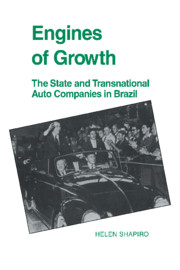Book contents
- Frontmatter
- Contents
- Tables and Figures
- Acknowledgments
- 1 Approaches to State Intervention
- 2 Why Auto?
- 3 The Determinants of Firm Entry
- 4 Rent Redistribution and Linkage Effects
- 5 The Automotive Parts Sector
- 6 Conclusion
- Appendix A Data Exhibits on the Brazilian Auto Industry
- Appendix B José Almeida's Calculation of Subsidies Provided to the Brazilian Automotive Industry
- Index
2 - Why Auto?
Published online by Cambridge University Press: 11 September 2009
- Frontmatter
- Contents
- Tables and Figures
- Acknowledgments
- 1 Approaches to State Intervention
- 2 Why Auto?
- 3 The Determinants of Firm Entry
- 4 Rent Redistribution and Linkage Effects
- 5 The Automotive Parts Sector
- 6 Conclusion
- Appendix A Data Exhibits on the Brazilian Auto Industry
- Appendix B José Almeida's Calculation of Subsidies Provided to the Brazilian Automotive Industry
- Index
Summary
Juscelino Kubitschek first met Admiral Lúcio Meira, a staunch advocate of the Brazilian automotive industry, in 1955 while campaigning for the presidency in the state of Bahia. Meira had directed a subcommission on motor vehicles during the 1951–4 Getúlio Vargas administration before he was “exiled” to this post in northeastern Brazil by then-President Joāo Café Filho, Vargas's successor. Meira used the encounter as an opportunity to convince Kubitschek that automobiles should be included in his proposed Target Plan, a state-sponsored industrialization program. At a political rally later that same day, Kubitschek tested the idea by promising that, if elected, he would initiate production of a national automobile. The idea was received enthusiastically. Convinced of the project's political expediency, he quickly added automobiles to his list of developmental targets. Despite the haphazard route by which Kubitschek came to include autos among his campaign pledges, the industry would become central to his industrialization program. After the elections, Meira returned to Rio de Janeiro, the capital, as Kubitschek's minister of transportation and public works, with supervisory responsibility for the formulation and implementation of the automobile program.
Meira's suggestion did not come out of the blue. It emerged from years of discussions on government policies toward this sector in which he had played a vital role. This chapter outlines how the decision to produce automobiles was arrived at in Brazil. It shows how the idea of a domestic auto program first emerged in response to the country's postwar balance-of-payments crises but soon took on more strategic significance.
- Type
- Chapter
- Information
- Engines of GrowthThe State and Transnational Auto Companies in Brazil, pp. 28 - 69Publisher: Cambridge University PressPrint publication year: 1994



